Frank Foukal Lynching - Part 1
Foukal 'lynching' occurred in spite of presidential appeal
Czech settler shot to death in jail in 1919
Printed in The Independent on Thursday, March 6, 2012
By Bob Morgan - Special to Gulf Coast Newspapers
Part I of a four-part series

SILVERHILL – A tornado that struck in March 2011 left its marks on a landmark structure in this central Baldwin town of 600.
The "Little Bohemian Hall" was built in 1920 by Czech settlers who came to Silverhill beginning in 1909. The Czech settlers came to a community that had been founded in 1897 as a Scandinavian colony by Oscar Johnson and others who, in turn, had come to this area from Chicago. The public hall, built by the labors of those Czech settlers, became a place for the Czech people to meet for social and entertainment purposes. In time the public hall came to serve as a schoolhouse as well for the settlers' children.

Little Bohemian Hall was built in 1920 by Czech settlers who came to Silverhill beginning in 1909. It became a place for the Czech people to meet for social and entertainment purposes.
The landmark building was shifted off its foundation and sustained extensive damage during a tornado that struck the town March 9, 2011.
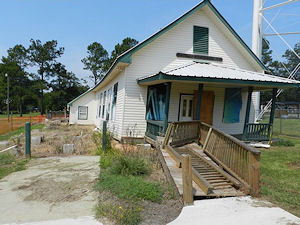
The tornado of 2011 damaged the "Little Hall" at its location near the Silverhill water tank where it was used by the town for meetings and social events such as receptions and family reunions. Before that, since 1978, the "Little Hall" had served as a band room at Silverhill School. The building had been moved to the school from its original location on what is still designated "Bohemian Hall Road" on the outskirts of present day Silverhill.
The land on which the "Little Bohemian Hall" was originally constructed was donated by one of those Czech settlers, Anton Kulicka (pronounced Ku-litch-ka). Anton had a sister named Celestina who, in 1911 in Texas, married Frank Foukal (pronounced Focal), a Czech, who had left Europe and arrived in Texas in 1907. The Kulickas and Foukals would eventually leave Texas and settle in Silverhill in 1912. Frank Foukal and Celestina, nicknamed "Tiny," would have a son and daughter born in Silverhill. Frank Foukal, on the other hand, would die a cruel, shocking death here in Baldwin County at age 36.
Today (2012), the "Little Hall," bent and crooked and pushed off its foundation by strong winds, will get another chance if citizens have anything to say about it. A "Save the Little Hall Committee" has been formed and money raised to make repairs to the building. The plan at present is to move the "Little Hall" once again; the question before the town council at this writing is where. History, on the other hand, cannot be patched up or re-positioned. What happened to Frank Foukal is ultimately stark and beyond historical redemption. The events surrounding his death might conceivably have involved an international backlash from a World War. Nationally, Frank Foukal's death invokes a dark and loathsome chapter in American life and justice.
On July 26, 1918, President Woodrow Wilson made a national appeal to stop the practice of lynching in this country. He called lynching a "disgraceful evil." Less than a year after that appeal Frank Foukal was lynched. Again, the forces that resulted in his death could have been war-related; who can say with certainty. Suffice it to say at this point that what eventually happened to Frank Foukal in Baldwin County began with a dispute over a mule.

COMING TO SILVERHILL
Frank Foukal's World War I Draft Registration Card, recorded in the National Archives, notes these particulars about the man: He was 6 feet tall, had blue eyes, dark hair and a medium build. Where "Place of employment" is asked for on the draft card the word "Farmer" is written. To "Native born" the word "Bohemia" is written. His nearest relative is listed on the card as "Teney Foukal," presumably a reference to his wife "Tiny."
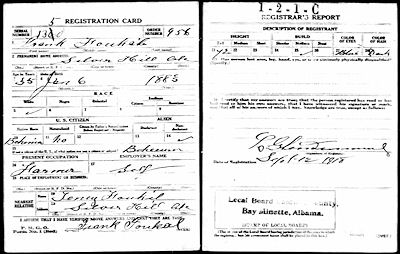
Frank Foukal's World War I Draft Registration Card.
Registering for the draft along with millions of other young men wasn't Frank Foukal's first contact with the military. According to William Howard "Bill" Young's self described "biographical story" Czech Mate, which is based on letters and correspondences of Czechs who lived in Silverhill, Frank Foukal had joined an infantry regiment in his native land when he was 21. He was discharged due to "poor eyesight."
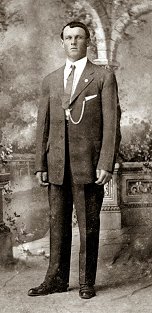
Frank Foukal
Frank was the youngest son of five born to Joseph and Anna Foukal in Rakvice, Moravia. (Moravia and Bohemia were empires within what is today the Czech Republic and the names became synonymous for some.) According to Bill Young's biographical story, from which some of the following is taken, within a year of being discharged from the military in his homeland, Frank Foukal left Europe and arrived in Galveston, Texas. The year was 1907. We know from the U.S. Census of 1910 that Frank was working in a lumber yard in Deweyville, Texas. According to Young, one of Frank Foukal's fellow workers at the lumber yard was Joseph Kulicka, a Czech from Moravia, who had been in the U.S. longer than Frank.
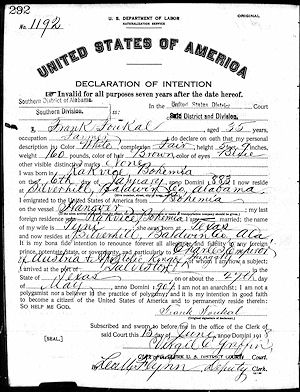
Frank Foukal's Intent to become U.S. Citizen.
On May 1, 1911, Frank married one of Joseph's daughters, Celestina, then 19. The following year the Foukals and Kulickas moved to Alabama and settled in Silverhill. By Christmas of 1912 Frank and Celestina had a son born in Silverhill. His name was Walter.
On June 28, 1914, war started in Europe. Within a couple of weeks of the war's beginning in Europe, the Foukals had another child, a daughter. Her name was Ludmila but they called her "Lilly." In 1915 the British passenger liner Lusitania was sunk by a German submarine. Some American citizens died in the incident. Bill Young makes the following observation in connection with the attack on the Lusitania:
"To some people Bohemians were considered the same as Germans so Baldwin County, Alabama, with its large number of immigrants from Czechoslovakia, was just the place for hot tempers to start trouble. In 1917 the United States entered the war in Europe and it became World War One."
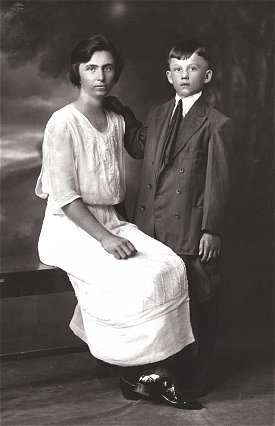
Mother and son - Frank Foukal's wife, Celestina raised their children, Walter and "Lillie," on the farm after his murder. She is shown above in a photo with Walter.
Walter Foukal, Frank's son, had his sixth birthday on Christmas Eve 1918. The war in Europe had ended just weeks before, on Nov. 11, 1918. Six months after Walter's birthday a seemingly innocent event occurred that would result in his father's shocking death.

"… IT ALL ENDED TERRIBLY."
Again, following Bill Young's narrative from Czech Mate, the following series of events occurred.
Frank Foukal sold a mule for $55 to one Robert Bishop of Point Clear. On a Sunday, June 1, 1919, Bishop brought the mule back to the Foukal farm, saying he wanted his money back; that the mule wasn't worth what he paid for it. Frank wasn't home, and Frank's wife, "Tiny," refunded Bishop a portion of the money out of funds she had. Upon returning home and being told of the development, Frank determined the mule had been "mistreated and overworked" in Bill Young's words. Robert Bishop returned to get the rest of his money and brought his brother and a shotgun with him.
The men were unable to reach an agreement concerning the mule and an altercation occurred. Shots were exchanged between Frank and Robert Bishop's brother. The Bishops left the scene with Frank following. Frank fired his rifle at their buggy, killing Robert Bishop. The Baldwin Times on June 5, 1919, in an article on the killing of Bishop, referred to Frank Foukal as a "Bohemian, residing near Silverhill." The newspaper put Robert Bishop's age at 27 and identified him as a "farmer."
That same issue of The Baldwin Times recounted the shooting incident and reported that after Robert Bishop got in his buggy and left, he had gone about a mile when Frank Foukal "fired upon him with a high powered rifle at a distance of 450 feet killing Bishop instantly."
A month later The Baldwin Times carried a front page letter from J.M. Bishop of Barnwell that purported to be the "true story" of what happened regarding the shooting and the mule. J.M. Bishop, whose letter was dated June 26, 1919, is described as a long time subscriber to The Times. His relationship to Robert Bishop is not set forward in the letter.
According to J.M. Bishop, the mule in question worked fine on an empty wagon but failed in "plowing and hauling." His account of what happened between Frank Foukal and Robert Bishop concerning the mule recounts points of civility, politeness and courtesy between the two men to a point. It also mentioned a bounced check that allegedly came about in connection with the business involving the mule. Then, at a crucial point, the letter alleges Frank Foukal went inside and came out with a gun and began firing.
Robert Bishop is memorialized at the conclusion of the letter: "The deceased left a wife and two children, a father and mother, five sisters and five brothers, forty-three nieces and nephews, besides a host of friends and other relatives."
Whatever the particulars might have been, following the shooting Frank Foukal went immediately to the Sheriff's Office in Bay Minette and surrendered. He was placed in the Baldwin County Jail to await trial. At a hearing, he was held without bond awaiting a decision from a grand jury. According to Bill Young's account, Frank feared he would not receive a fair trial and never be released. He also feared for his life even should he be exonerated. He told "Tiny" that should something happen to him he would find a way to get word to her. She was to check his body closely if he was killed while in jail.
On Sunday, June 22, 1919, in the early morning hours, a mob broke into the jail while the sheriff was sleeping. Using the jail keys, the men went into Frank's cell and shot him to death. Articles in The Baldwin Times in the aftermath of the lynching incident would contain the details: The mob came between 1 a.m. and 2 a.m. that morning; they entered the "sheriff's sleeping room" and overpowered him, two of the mob members holding a pillow over his face while the others secured his keys; jail windows were open; at least five shots were initially fired at Frank Foukal, but Louis Bishop, a brother of Robert Bishop, testified that he found Frank to be still alive and "fired his revolver into the body as long as it would shoot"; and there were 35 men alleged to have conspired to kill Frank Foukal, the first attempt failing on June 17 when the conspirators automobiles broke down on the way to Bay Minette.
When Frank's body was released to a funeral home, Bill Young's account said "Tiny" asked to search his personal effects. She found two notes written in Czech hidden in the lining of his coat. The one dated June 6, 1919, is addressed to "Dearest Wife and Children." It reads in part, "What I have in my heart will go with me into the grave but my heart and mind is clear because I was protecting what was rightfully mine. They hounded me and I couldn't do anything to protect myself so it all ended terribly."
Frank, in the same note, tells his wife and children that his only other alternative after Robert Bishop's shooting would have been to "leave Alabama," but, "To leave you all was unbearable."
Continue to part 2, God, insanity, well known citizens.

|